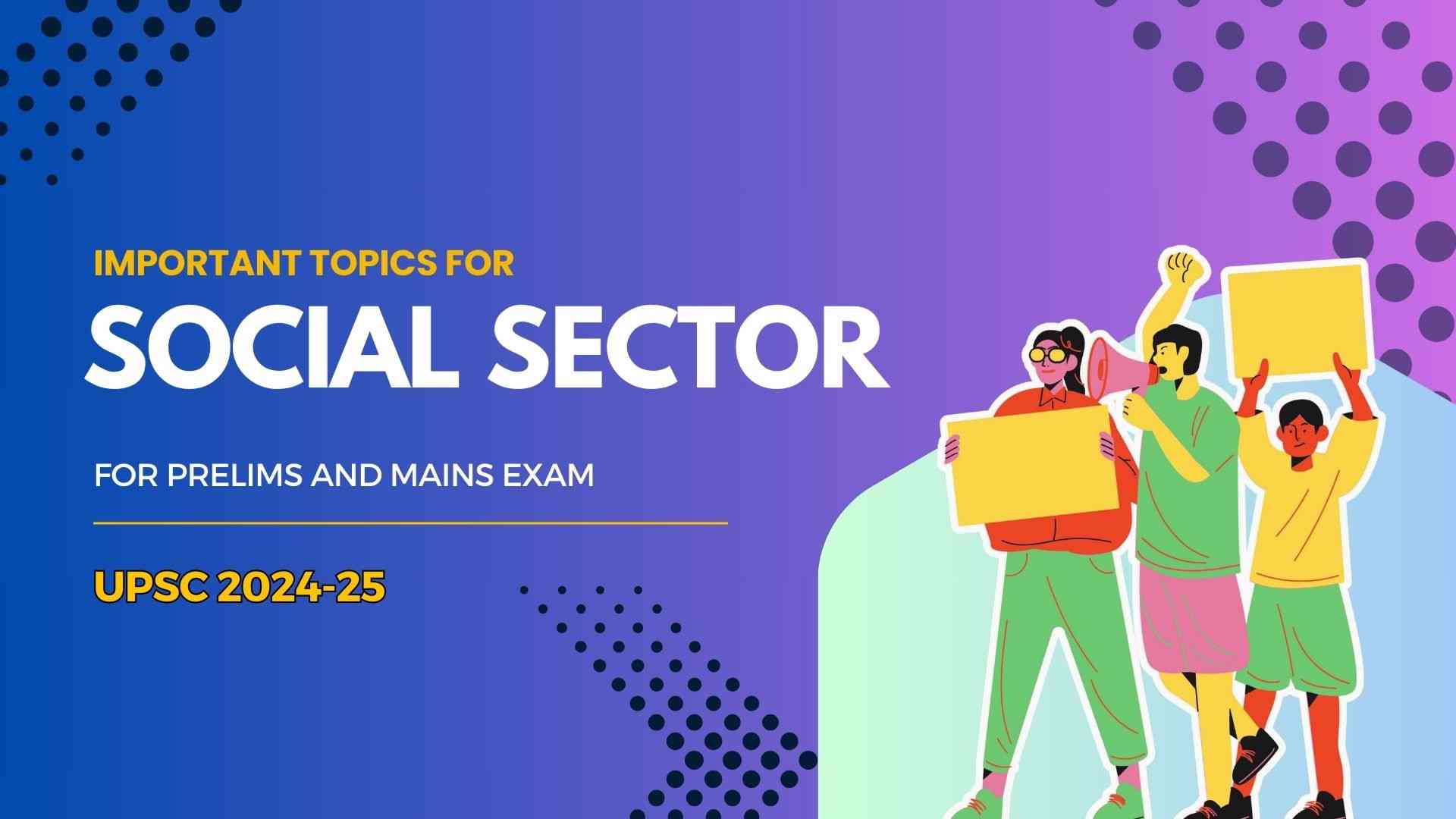Important Topics for Social Sector 2024-25
(A Comprehensive Guide for UPSC General Studies Paper 2)
Introduction
The social sector plays a foundational role in shaping a nation’s progress, directly influencing economic growth, human capital development, and overall well-being. In India, various public services and welfare initiatives are central to ensuring equitable access to resources and opportunities. However, systemic challenges persist, requiring continuous reforms, innovative policies, and robust implementation mechanisms.
For UPSC aspirants, a thorough understanding of the social sector is essential, as it forms a significant part of General Studies Paper 2. Questions in both Prelims and Mains require candidates to stay updated with current affairs, analyze the effectiveness of policies, and critically assess ongoing challenges and reforms. This course, “Important Topics for Social Sector 2024-25,” is designed to equip students with the necessary knowledge and analytical skills to approach this section with confidence.
What This Course Offers
This course provides a structured approach to mastering social sector issues, covering developments from June 2024 to April 2025. The content has been curated to ensure aspirants not only build a strong conceptual foundation but also develop the ability to apply their knowledge in answer writing.
The course includes:
✅ Comprehensive Notes: Detailed coverage of important developments, government initiatives, legislative measures, and global comparisons.
✅ Mains-Based Questions: Thought-provoking questions with structured answer frameworks to enhance answer-writing skills.
✅ Prelims-Based Questions: Objective-type questions focusing on key facts, schemes, and reports to strengthen recall and conceptual clarity.
Key Focus Areas
1. Public Welfare and Service Delivery
The effective functioning of public services is crucial for achieving social equity and development. The course delves into recent policy changes, technological interventions, and best practices that improve accessibility and efficiency. It also explores the role of governance and institutional frameworks in ensuring accountability and better service outcomes.
2. Challenges in Human Development
Addressing disparities in human development remains a priority. This course examines various dimensions of inequality, ranging from economic and gender-based disparities to regional imbalances. It evaluates existing programs aimed at improving quality of life and suggests potential reforms to enhance their impact.
3. Social Infrastructure and Economic Growth
Investment in social infrastructure is pivotal for economic empowerment. This section covers key sectors contributing to human capital formation, highlighting recent advancements, government initiatives, and areas where further policy interventions are required.
4. Pressing Socio-Economic Concerns
Certain long-standing challenges continue to impact vulnerable populations disproportionately. The course discusses multidimensional aspects of these issues, analyzing the success and limitations of ongoing interventions. It also explores alternative approaches drawn from international best practices.
5. Governance and Policy Interventions
Strong governance structures and evidence-based policymaking are necessary for addressing social sector challenges effectively. This module examines recent policy shifts, legal frameworks, and institutional mechanisms introduced to drive progress. It also emphasizes the role of public-private partnerships, community-led initiatives, and global collaborations in enhancing service delivery.
How This Course Benefits Aspirants
-
Saves time by compiling the most relevant current affairs and key policy updates in one place.
-
Enhances analytical skills through well-structured answer-writing frameworks for Mains.
-
Improves factual retention with objective-type questions tailored for Prelims.
-
Provides a comparative perspective by integrating international examples and best practices.
Conclusion
Achieving inclusive and sustainable development requires a multi-pronged approach that balances economic growth with social justice. For civil service aspirants, understanding the evolving landscape of the social sector is vital for both the UPSC Prelims and Mains.
This course offers a comprehensive and dynamic learning experience, enabling aspirants to develop a strong grasp of contemporary issues, critically evaluate policy interventions, and articulate well-structured answers in the examination. With a focus on holistic preparation, this course will help aspirants stay ahead in their journey toward success in the UPSC Civil Services Examination 2025.
Course Features
- Lectures 19
- Quizzes 12
- Duration 10 weeks
- Skill level All levels
- Language English
- Students 0
- Certificate No
- Assessments Yes
- 12 Sections
- 19 Lessons
- 10 Weeks
- ASMITA Project2
- KIRTI Program2
- SAFAL test cycle2
- National Immunization Coverage (WUENIC) 20232
- Global Education Monitoring2
- Impact of Climate Change on Education3
- State of Food Security and Nutrition in the World Report 20243
- Nutritional Security3
- Universal Health Coverage in India3
- Monkeypox3
- Mental Health3
- Fight against Tuberculosis3


